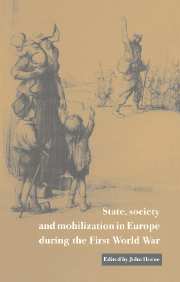Book contents
- Frontmatter
- Contents
- List of contributors
- Preface
- 1 Introduction: mobilizing for ‘total war’, 1914–1918
- I National ideals
- II Solidarities and minorities
- 5 Mobilizing labour and socialist militants in Paris during the Great War
- 6 Between integration and rejection: the Jewish community in Germany, 1914–1918
- 7 Wackes at war: Alsace-Lorraine and the failure of German national mobilization, 1914–1918
- III Army and nation
- IV The limits and consequences of mobilization
- Notes
- Index
7 - Wackes at war: Alsace-Lorraine and the failure of German national mobilization, 1914–1918
Published online by Cambridge University Press: 04 December 2009
- Frontmatter
- Contents
- List of contributors
- Preface
- 1 Introduction: mobilizing for ‘total war’, 1914–1918
- I National ideals
- II Solidarities and minorities
- 5 Mobilizing labour and socialist militants in Paris during the Great War
- 6 Between integration and rejection: the Jewish community in Germany, 1914–1918
- 7 Wackes at war: Alsace-Lorraine and the failure of German national mobilization, 1914–1918
- III Army and nation
- IV The limits and consequences of mobilization
- Notes
- Index
Summary
Introduction
In Alsace-Lorraine, a largely German-speaking region annexed from France in 1871, the mobilization process of 1914–18 was a failure that transcended the general failure of mobilization in Germany. This chapter aims to show how the military leadership proved unable to realize the military potential of its Alsace-Lorraine troops, and how the attitude of Alsace-Lorrainers towards the Reich was transformed by the war from acquiescence into hostility. The argument is thus about the breakdown not only of military, but also of political and cultural mobilization.
Before 1914, a strong regional identity was still alive, based not only on anti-Prussian resentment, but also on the ideas of parliamentary democracy under the influence of French republicanism and the legacy of 1789. After the granting of the constitution in 1911 the parliamentary representatives of Alsace-Lorraine campaigned for a degree of autonomy equal to that enjoyed by the other Länder. Its citizens continued to resent discrimination, such as the perceived lack of French language instruction and the prohibition of speaking the Alsatian dialect in schools, even in private conversation. Above all they felt humiliated by the treatment of Alsace-Lorraine civilians and recruits as untrustworthy Wackes by the German military, as in the Zabern affair of 1913.
In view of such discriminatory treatment and mutual distrust, the argument that Alsace-Lorraine hardly differed from other German regions with strong federalist tendencies, such as Bavaria, and was on the road to full integration into the Reich, is not convincing.
- Type
- Chapter
- Information
- Publisher: Cambridge University PressPrint publication year: 1997
- 7
- Cited by



